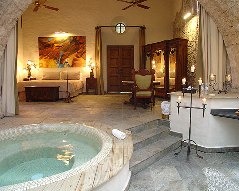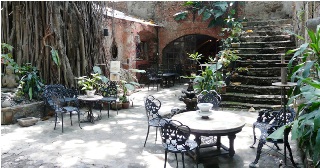By Teresa Gardner
ITWPA Member

Cortés arrived in the 1520s and immediately went about subjugating the local Indians. After ten years of ravaging much of Mexico, he chose Cuernavaca to live out the rest of his life because of the mild climate, and he built an impressive palace there. Incidentally, Cuernavaca is known as “the city of eternal spring,” boasting annual average daily temperatures of 70 degrees and lush vegetation.
Cortés ordered haciendas — large land estates with mansions — to be built surrounding Cuernavaca, and appointed Spanish Lords to run them, often mercilessly over the natives. In their heyday, each hacienda was a rural, autonomous social unit. The haciendas in Morelos became some of the world’s most important sugar plantations of the 16th and 17th centuries.
The Mexican Revolution of 1910 – 1920 proved the downfall of the haciendas. Zapata and his followers roamed the country, burning and pillaging every hacienda in sight, eventually restoring land and rights to the people.
These venerable structures conjure up surreal images of ruined palaces, but still possess a faded grandeur. The haciendas are mysterious, yet magical, and many have been restored and turned into magnificent resorts today.
Exploring the old haciendas is like stepping into another world. Walking the grounds is an adventure in architecture and a veritable feast for the eyes. Strolling palm tree-lined paths, past purple jacarandas, shock-orange tabachines trees, and fluorescent fuchsia bougainvillea, you’ll find fountains, sculpted gardens, stunning pools ringed by centuries-old columns and aqueducts, talavera-tiled patios, secluded terraces, and walls overgrown with vegetation.

Weddings, receptions and conventions are mainstays of the haciendas’ business today. Every hacienda includes a chapel on its grounds due to Jesuit and Franciscan missionaries sent from Spain, who played a key role in the brutal expropriation of lands from the Indians.
Serving as the backdrop for many films, these character-laden edifices have played host to the likes of Paul Newman, Robert Redford, Anthony Quinn and Harrison Ford. In fact, Quinn wrote in one guest book: “Whoever has dreams that aren’t fulfilled here, ought to leave dreaming alone.”
One hacienda entices visitors with the invitation, “Un Mundo Aparte.” Truly, a visit to any one of these haciendas is “a world apart” — a place that plunges one into the grandiose past of Colonial Mexico and revives the energies of all who stay within their walls.
If you go:
The finer haciendas in Morelos are:
• Hacienda de Cortes: www.hotelhaciendadecortes.com.mx
• Hacienda San Gabriel de las Palmas: www.haciendasangabriel.com
• Hacienda San Antonio el Puente: www.hotelhaciendasanantonioelpuente.com
• Hacienda San Jose Vista Hermosa: www.haciendavistahermosa.com.mx
• Hotel Hacienda Cocoyoc: www.cocoyoc.com.mx
All are located within a 30 minutes’ drive of Cuernavaca and 90 minutes from the México City International Airport.
If you wish to purchase this article for your publication, click here to contact the author directly.


